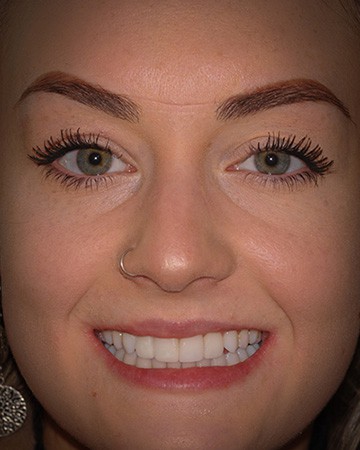Dental Composite Bonding
A minimally invasive and conservative way of improving the natural aesthetics of your smile.
Dental Composite Bonding in Exeter
Composite bonding (also known as edge bonding or dental bonding) offers a fantastic non-invasive solution for enhancing the appearance of your natural teeth. Composite bonding can be suitable for a variety of patients to correct minor aesthetic issues such as chips or cracks, small spaces between teeth or to disguise discolouration and repairing tooth imperfections by enhancing their aesthetic appearance. Composite resin in bonded onto the tooth surface and contoured to restore the tooth’s natural appearance or used to create a more desirable appearance. This is a minimally invasive and can easily be removed or adjusted should you change your mind in the future or want to add additional changes such as a squared edge or rounded corner. The composite material used is shade matched to your natural tooth, meaning there will be a seamless blend from the restoration to the tooth. The process of composite bonding is typically quick and minimally invasive, making it a very popular choice for minor cosmetic dental enhancements.
If you are considering investing in a new smile and think composite bonding may be the way forward for you, please contact us for your complimentary, no obligation consultation. Our dedicated team will ensure your wants and needs are listened to carefully and executed accurately and precisely using market-leading materials and modern dental techniques.
Common applications for composite bonding:
-
- Repairing chipped teeth. Our expert clinicians use composite resin to fill in and reshape a chipped area where small portions of the natural tooth have fractured and come away.
- Closing gaps. Composite bonding can be used to close small gaps and spaces between the teeth. These gaps are generally part of the natural shape and structure of the tooth, but some people do not like the appearance and wish to disguise it. This can provide a more even and harmonious smile.
- Covering discolouration. Teeth that are discoloured or have ingrained stains that don’t respond to tooth whitening treatment can be effectively masked using tooth-coloured dental bonding techniques.
- Reshaping irregular teeth. Teeth that are misshapen due to wear or have unusual congenital contours can be reshaped with composite bonding to blend in with the rest of the smile.
How is composite bonding done?
-
- Preparation. The dentist will begin by cleaning the tooth and with your input, determining the shade of composite resin that matches the natural colour of the teeth. A mock-up design can be done initially so that you can discuss how you envision your new smile to look and feel.
- Application. The tooth-coloured composite resin is applied to the prepared tooth surface in fine layers, shaping and moulding the material to achieve the desired appearance.
- Bonding. Once the desired shape and appearance is achieved, the composite resin is bonded to the tooth using a special light cure to harden the material.
- Finishing touches. After the bonding process is complete, your dentist will trim and polish the composite to ensure it blends seamlessly with the surrounding teeth, giving a natural looking result. Composite bonding can always be adjusted, reshaped and repolished in the future as it is a conservative treatment, leaving no lasting damage to the tooth surface beneath.
- Future. It is essential to note that composite bonding is not as durable as lab-made (but more invasive) treatment, meaning it may require periodic touch-ups or replacement overtime. This timescale is dependant on your habits and oral hygiene.
FAQs
First, you will need to attend the practice for a comprehensive assessment, so your eligibility can be checked. Lots of factors need to be considered prior to composite bonding treatment being prescribed. Most importantly, you must have clinical health. By this we mean there is no decay or infections present, and your gums are healthy and stable. Our expert dentists will also need to assess your bite (occlusion). This is very important as there needs to be adequate space for your teeth to meet, bite and talk comfortably after composite bonding is placed.
Composite bonding is a minimally invasive procedure meaning no tooth surface is removed for the treatment. Therefore, it does not damage the integrity of your natural tooth. Composite bonding does not have any major associated risks, however, over time, the composite resin can become chipped or stain due to daily wear and tear and the functioning of your teeth, but this does not affect the natural tooth itself.
Dental composites are made of a hybrid resin material which is a hard, synthetic polymer. The resin is mixed with glass particles to create a hard, tooth-coloured dental restoration. Composite material is available in several shades of whites and yellows, allowing the dentist to shade match to the natural tooth. Composites are appropriate for most areas of the mouth, even on front teeth, where aesthetics are important. The composite is bonded directly to the tooth, meaning the dentist does not need to remove tooth surface when preparing it for bonding.
There is no clinical evidence to determine the lifespan of composite bonding. However, composite bonding can be prone to staining and colour change over time. Therefore, your diet, lifestyle, and food habits play a key role in determining the lifespan of your composite bonding. Composite bonding can be prone to wear and chipping, which can be repaired easily in practice. Where patients have undergone extensive dental bonding, we usually suggest for the patients to wear a nightguard when sleeping to protect the composite from clenching and grinding habits.
Dental bonding is priced per tooth and like any restoration or treatment, it is subject to assessment. As a guide price, composite bonding starts at approximately £275 per tooth.
FAQs
Am I eligible for composite bonding?
First, you will need to attend the practice for a comprehensive assessment, so your eligibility can be checked. Lots of factors need to be considered prior to composite bonding treatment being prescribed. Most importantly, you must have clinical health. By this we mean there is no decay or infections present, and your gums are healthy and stable. Our expert dentists will also need to assess your bite (occlusion). This is very important as there needs to be adequate space for your teeth to meet, bite and talk comfortably after composite bonding is placed.
Will it damage my teeth?
Composite bonding is a minimally invasive procedure meaning no tooth surface is removed for the treatment. Therefore, it does not damage the integrity of your natural tooth. Composite bonding does not have any major associated risks, however, over time, the composite resin can become chipped or stain due to daily wear and tear and the functioning of your teeth, but this does not affect the natural tooth itself.
What is composite constructed out of?
Dental composites are made of a hybrid resin material which is a hard, synthetic polymer. The resin is mixed with glass particles to create a hard, tooth-coloured dental restoration. Composite material is available in several shades of whites and yellows, allowing the dentist to shade match to the natural tooth. Composites are appropriate for most areas of the mouth, even on front teeth, where aesthetics are important. The composite is bonded directly to the tooth, meaning the dentist does not need to remove tooth surface when preparing it for bonding.
How long will it last?
There is no clinical evidence to determine the lifespan of composite bonding. However, composite bonding can be prone to staining and colour change over time. Therefore, your diet, lifestyle, and food habits play a key role in determining the lifespan of your composite bonding. Composite bonding can be prone to wear and chipping, which can be repaired easily in practice. Where patients have undergone extensive dental bonding, we usually suggest for the patients to wear a nightguard when sleeping to protect the composite from clenching and grinding habits.
Is it expensive?
Dental bonding is priced per tooth and like any restoration or treatment, it is subject to assessment. As a guide price, composite bonding starts at approximately £275 per tooth.
For more complex treatment plans we can offer our patients 0% finance plans to help spread the cost of their treatment. Please contact us or speak to a member of the team to find out more.

